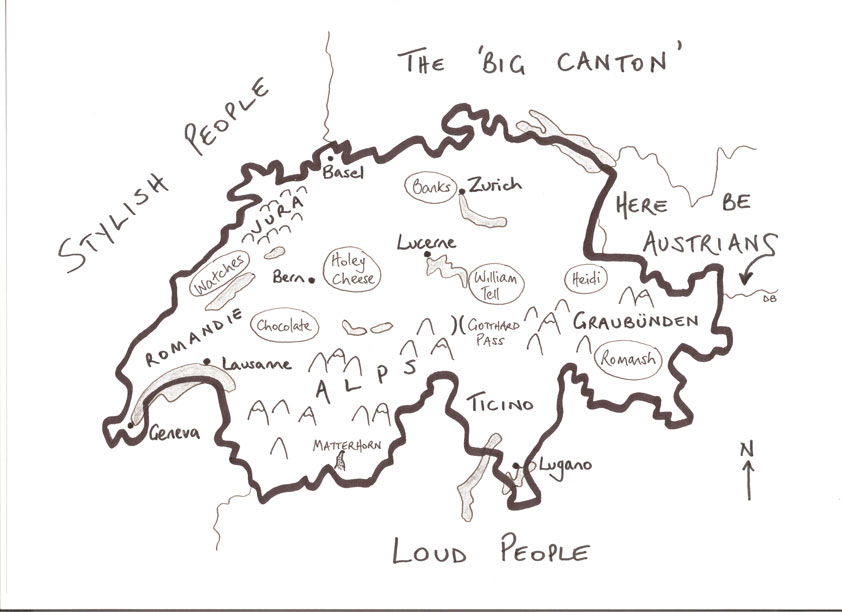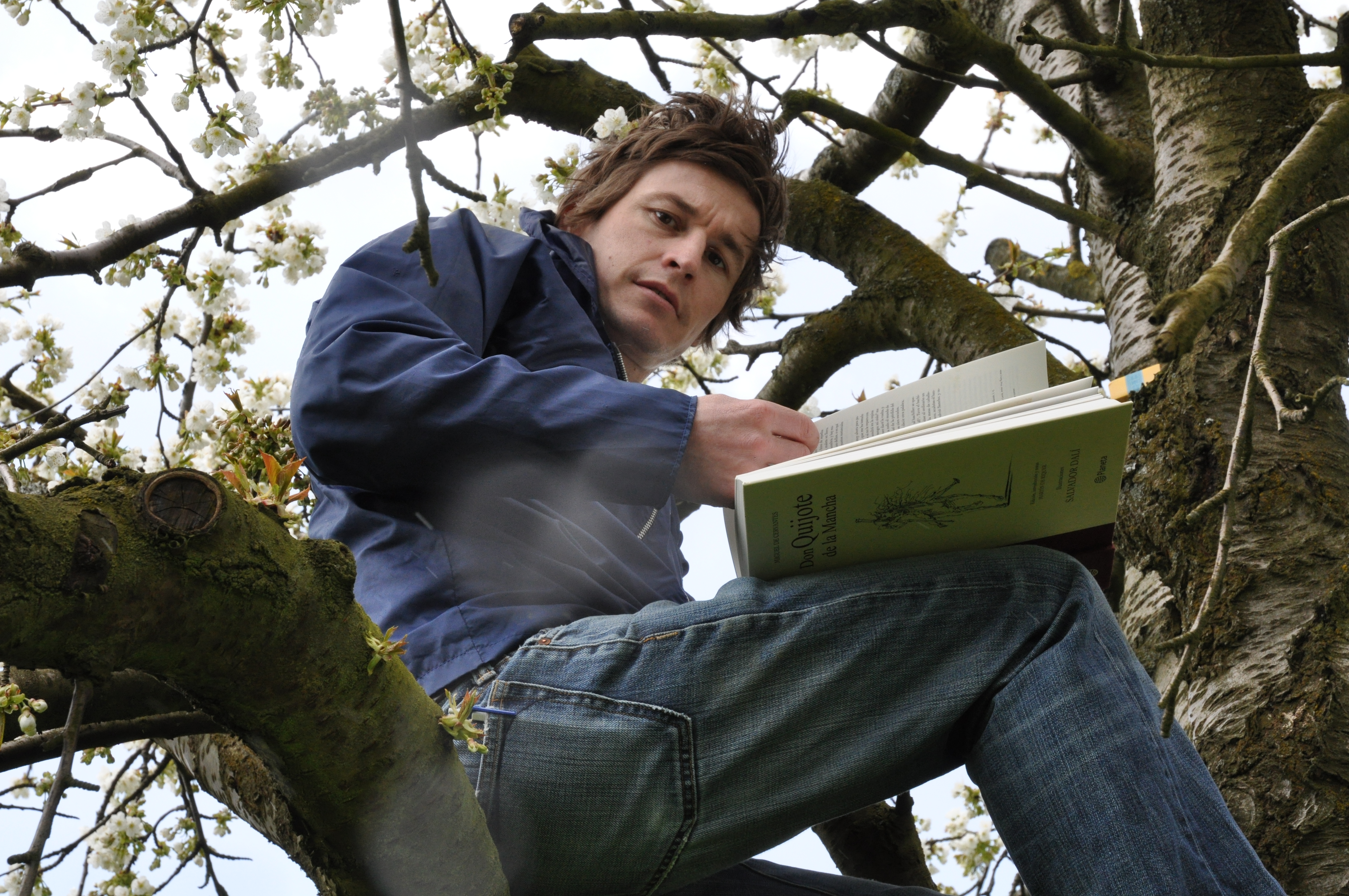English books in Switzerland: a new chapter?

The vast majority of English-language books in Swiss bookshops are imported. Some, however, are conceived and published in Switzerland, often by Bergli Books. It’s a niche market trying to compete in the digital world.
“The US market is difficult but huge – if you can sell to one in 10,000 people, you’ve got a bestseller on your hands. In Switzerland, authors work hard to sell books in German or French, let alone English,” says American-Swiss author Richard Harvell, commissioning editor of Basel-based Bergli Books, whose publications “help newcomers feel at home in Switzerland”.
“When choosing projects, we need to feel we can sell 5,000 copies of a book otherwise we’re not going to make money on it – and that’s very difficult.”
Visit any big bookshop in a Swiss city and you will find shelves, if not an entire floor, of books in English. These range from the usual suspects such as Fifty Shades, Jamie Oliver and Harry Potter (the last of which topped the main Swiss charts in English) to travel guides, children’s books and esoteric self-help guides.
There will also be an “expat” section – usually called something like “Swiss interest” – filled with humorous expat experiences such as Bergli’s Ticking Along series and guides to living/working/giving birth and so on in Switzerland.
Bergli Books was founded by US author Dianne Dicks in 1990 and has since published more than 35 books about Swiss daily life, attitudes and values, dialect, school system, food and history. The majority are in English, some have been translated.
Bergli’s first successes, such as Dicks’s Ticking Along series, were collections of personal experiences written by expats in a lightly humorous but informative way, in a style similar to Bill Bryson.
Richard Harvell became commissioning editor of Bergli in January 2014, four months after it was acquired by Basel printing and publishing company Schwabe (the oldest publisher in the world, founded in 1488).
Harvell, 35, was born in New Hampshire and has lived in Switzerland for ten years; he is now a Swiss citizen. His debut novel, The Bells, a historical drama, was published in 2011.
He says that in recent years Bergli has had more success with reference works. Bestsellers include Hoi, a light-hearted illustrated guide to Swiss German which has sold more than 20,000 copies, Swiss History in a Nutshell, a concise guide to Swiss history with cartoons, and Going Local, an authoritative guide to the Swiss school system.
‘Curious Swiss’
Harvell estimates 50% of Bergli’s sales are made in bookshops in Switzerland. Another 10% are in Britain (where Bergli has a distributor), and the remainder are shipped inside and outside the country directly from the printers of parent company Schwabe in nearby Muttenz. Schwabe, the world’s oldest publisher, bought Bergli in 2013.
Franziska Stocker, co-owner of Basel’s largest independent bookshop Bider & Tanner, which has a floor devoted to English books (as well as random goodies for homesick expats such as shortbread and baked beans), says in addition to expats, many customers are also “curious Swiss”.
“On the one hand, we find it very interesting how expats see us, because we have a lot of interaction with them. We also find the Ticking Along books, for example, very amusing – it’s funny having the mickey taken out of us!” she says.
Stocker estimates that of customers who buy Bergli-type books, 70% are expats and 30% Swiss.
Harvell adds that a lot of language schools use the books as material for Swiss who are learning English.
Internet effect
The greatest recent game-changer has undoubtedly been the internet, which Harvell says has changed publishing in two main ways.
“First, the books people consume: I don’t think we’ll bring out another Ticking Along-type book because that’s the experience of browsing forums or social media such as a Facebook newsfeed. People today are much better networked with other expats than they were 20 years ago. They don’t need short funny stories – they want good-quality practical guides,” he said.
“Also, book selling has changed hugely, particularly in the English-speaking world, because of the discounts that Amazon and other large retailers require us to give them. It’s difficult. We’re not making money from books we sell outside Switzerland at the moment. More and more of our Swiss-based customers are turning to Amazon in Britain or Germany.”
The fact is that books are considerably more expensive in Switzerland than neighbouring countries and especially Britain and the United States. Bergli’s Swiss History in a Nutshell, for example, sells at CHF24 ($27.50) from Bergli but can be bought for $15 on Amazon.com.
Harvell explains the book pricing system in Switzerland – and why visitors or expats might be shocked by a trip to a bookshop:

More
Book prices in Switzerland
Sourcing material
Until now Bergli has produced on average three books every two years. Harvell would like to double this output – “to get people excited about opening a catalogue, you have to have new stuff in there”.
To this end, he has three main ways of sourcing content: using tried-and-tested authors who specialise in certain areas, such as food; translating and licensing already existing books, such as Swiss History in a Nutshell, which first came out in French; and receiving drafts on spec.
“I get emails almost every day from someone in Switzerland who has written a book. Some are very interesting, some also fit Bergli’s message of intercultural understanding but I just can’t see them selling enough – the market is so small,” he said.
“We then might like their work but not the book idea, so we talk and come up with new drafts and figure out how it would fit a market.”
So should swissinfo.ch readers, convinced they are sitting on a bestseller, get in touch? “Sure, as long as they don’t mind getting curt replies saying, ‘sorry, we tried that two years ago and it didn’t work’,” he says with a smile. “As an author myself, I know that writing a book is a long process often filled with disappointment and criticism. We’ll say no to 99% of book ideas.”
He says Bergli is considering expanding into “darker” territory, for example a book about murder and corruption in Malaysia featuring the Swiss Bruno Manser Fund.
He is also keen to bring out a Bergli novel, something the company has never done. “The thing is, with our books we’re not in direct competition with the behemoths of publishing in London and New York because they’re not publishing guides to speaking Swiss German. If we brought out fiction, we would be. We’d love to do it, but no book has come along that fits the bill.”
Changing market
Despite the changing publishing landscape, Harvell remains optimistic for Bergli, which might be a small fish in a small pond but one with a near monopoly.
“I’d say we’re the only publisher in Switzerland which publishes books in English specifically for the expat market. Schwabe publishes books in English, but they’re generally academic books. The same goes for Peter Lang in Bern.”
He also points out that people aren’t spending less on books – unlike with CDs – it’s just that they’re buying and reading them in different ways.
“What’s more, there will only be more expats coming to Switzerland and more people in Switzerland who can read English. Our books have always spread by word of mouth, and the internet makes word of mouth a lot easier.”
He maintains there is still demand for Bergli’s products. “I don’t feel we’ve saturated the market at all. The fact that Schwabe has taken on a small publisher shows there is a future to publishing English books in Switzerland.”
Johanna Jutzet, manager of the English Bookshop in Bern’s Stauffacher store, says that ten years ago Bergli Books basically had the expat market cornered, but that’s changed – “Bergli’s books remain very popular,” she told swissinfo.ch, “but there are now other titles encroaching on the market”.
She said that, in this genre, their clear bestseller over the past three years has been Swiss Watching by Diccon Bewes, published by Nicholas Brealey in Britain (although another one of Bewes’ books, Swisscellany, was published by Bergli).
She said Swiss Watching currently sells 30-40 copies a month, “huge for an English book”. See the related story, “The Swiss are a bunch of coconuts”, for a review and interview with Bewes, who used to be the manager of Stauffacher’s English bookshop and is now a member of the swissinfo.ch Public Council.
Jutzet said what they get asked for weekly are cook books and gift items. “Also children’s literature. Not just Heidi – an eternal seller – but also translated editions of Globi and A Bell for Ursli.”
“In general, we sell a lot of crime books and thrillers. A trend of the past three or so years is that adults are reading more fiction meant for young adults. This started with Twilight, now it’s The Hunger Games and Divergent. And also fantasy like Game of Thrones – escapist literature is still going strong and actually gaining readers.”
She added that more and more Swiss authors were being translated into English. “For example Pedro Lenz, who wrote a book in Bernese German [Der Goalie bin ig/The Goalie that’s me] which has now been translated into a Scottish dialect.”

In compliance with the JTI standards
More: SWI swissinfo.ch certified by the Journalism Trust Initiative













You can find an overview of ongoing debates with our journalists here . Please join us!
If you want to start a conversation about a topic raised in this article or want to report factual errors, email us at english@swissinfo.ch.